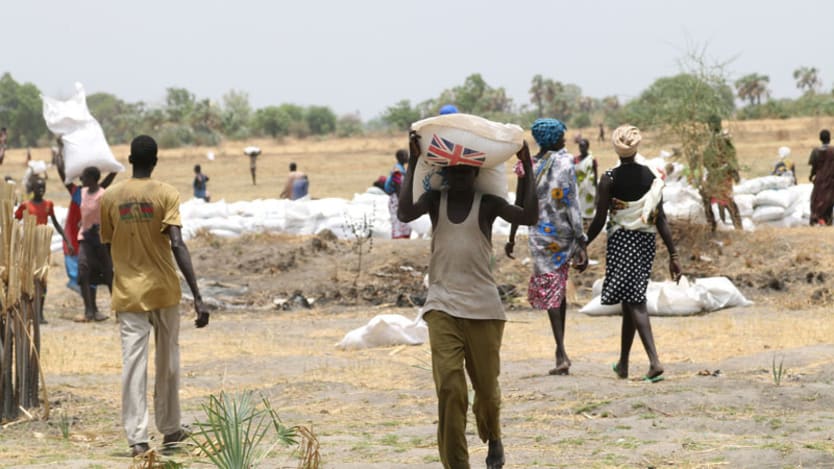
LONDON — The beleaguered £1.2 billion ($1.56 billion) cross-government Conflict, Stability and Security Fund has taken steps to improve transparency and oversight, and plans to improve its monitoring and evaluation processes, according to an annual report released Wednesday, while civil society groups say more work still needs to be done.
Reforms include publishing more detail about its programs and funding data; a new ministerial subcommittee to oversee its work; and initiatives to share lessons across departments.
Launched in 2015 to deliver on both British national security and U.K. aid objectives in fragile and conflict-affected countries, CSSF is a pooled fund that receives approximately half of its budget from the official development assistance budget. It is housed by the Foreign & Commonwealth Office and reports to the National Security Council.
See more on CSSF:
► Aid watchdog calls for 'urgent steps' to fix CSSF
► Webinar: How to work with the UK's Conflict, Stability and Security Fund
► Tips on applying to the Conflict, Stability and Security Fund
CSSF is intended to help deliver the U.K.’s cross-government aid strategy, which calls for 30 percent of ODA to be spent outside of Department for International Development spending by 2020. The way non-DFID agencies are spending ODA has long raised concerns among U.K. aid actors and watchdogs however, who fear aid managed outside of DFID is less transparent and less effective in achieving poverty eradication goals.
The fund has also been subject to three separate reviews over the past 18 months, most recently by the Independent Commission for Aid Impact, the U.K.’s aid watchdog, which awarded the fund an amber/red performance rating and raised concerns about its aid effectiveness, monitoring and evaluation capabilities, and commitment to sharing learning about what works in fragile and conflict countries. It also suggested the fund could risk legitimizing or “even becoming complicit in violations” by groups linked to human rights abuses, since ICAI found that some CSSF staff were failing to carry out the required “overseas security and justice assessments” on proposed programs before they started.
Civil society groups said they were pleased to see signs of progress in CSSF’s annual report, which outlines how the fund has been working to address these criticisms, but added there was some way to go.
“The CSSF deserves credit for the evident effort it has put into being more transparent,” said Claire Godfrey, head of policy and campaigns at Bond, the U.K.’s network of aid NGOs.
However, she said it has not done enough to address concerns about the limited amount of information it shares. The annual report states that it is not always possible to publish program spending data in order “to protect national security and to protect the safety and security of beneficiaries, partners and partner governments,” but the ICAI review found that “sensitivity and confidentiality” are sometimes “over-used” as a justification for not sharing information.
“There is still more to do if we are to see greater transparency, and moving toward presumed disclosure of program details and country strategies, without compromising safety and security, would be the correct direction,” Godfrey said.
Debbie Ball, head of fundraising at International Alert, an NGO that has been funded by CSSF, said the report demonstrated its “commitment to continually improving transparency where possible,” and that she welcomed the increased focus on results and outcomes to improve the evidence base. She added that “we would encourage the CSSF to do more to share and discuss these lessons across the sector, not just with CSSF staff.”
However, Labour politician Lloyd Russell-Moyle, a member of the International Development Committee which scrutinizes U.K. aid spending, accused CSSF of failing to address the strongest criticisms raised by the ICAI review.
“The government has cherry-picked the passages of the [ICAI] report where it was simply being polite. It has completely dodged ICAI’s most serious criticism, which is that we cannot even be sure if the CSSF is not aggravating the very problems it claims to address [because of the issues around human rights]. Is the CSSF sowing instability instead of stability?” Russell-Moyle told Devex.
The annual report states that overseas security and justice assessments are carried out for all projects that engage with security and justice authorities. They should be “in place for all programmes before activities commence,” and “should be reviewed for extensions to programmes and where there has been a substantial change in circumstances where a programme is operating.”
It adds that “by its very nature the CSSF works in challenging operating environments, which requires the UK government to accept a degree of risk,” but that “decisions about how much risk is tolerable within different parts of the CSSF portfolio is delegated to regional and thematic boards.”
Alongside ICAI, other critical reviews came in 2017 from the National Audit Office and the Joint Committee on the National Security Strategy.
The creation of a new subcommittee of the National Security Council, chaired by Minister for the Cabinet Office David Lidington, to provide ministerial oversight of the fund is one of the changes introduced since then. It met for the first time last month.
Since April, CSSF has also been managed by a new Joint Funds Unit, which covers both CSSF and the other cross-government pooled fund, the Prosperity Fund, and is intended to improve coherence between their operations.
“The sub-committee strengthens ministerial oversight of both funds and ensures we continue to learn lessons and drive improvements in how we engage in some of the world’s most fragile and challenging contexts,” Lidington wrote in the foreword to the annual report.
In response to transparency concerns raised by the various reviews, CSSF has now published two annual reports that include program summaries and funding data; has set up a webpage outlining how the fund works and its accountability structure; and is working to make more data on ODA spending available on the online Development Tracker tool.
The Joint Funds Unit is also working to improve the fund’s results management processes through stronger monitoring and evaluation systems, the report states, adding that where it is not possible for CSSF staff to do direct program monitoring for security reasons, the fund is increasingly contracting a third party to do the work.
On evidence and learning, it outlines a number of initiatives including hosting training courses and annual events for CSSF staff from different departments and regions to share lessons and improve cross-government working.
A government spokesperson said: “The CSSF was established three years ago to harness resources and expertise from across government towards building stability overseas and enhancing global and UK security. It has transformed the way the government responds to conflicts, instability and insecurity around the world. The CSSF's annual report highlights a number of successes from the CSSF's programmes, including supporting the peace process in Colombia and encouraging women in Pakistan to engage with the political process.”
Update, July 19: This story was updated to include a comment from the government provided after publication.
Search for articles
Most Read
- 1
- 2
- 3
- 4
- 5








